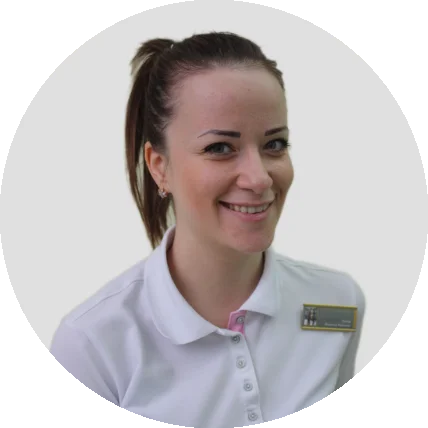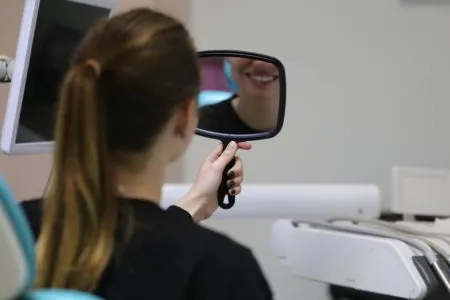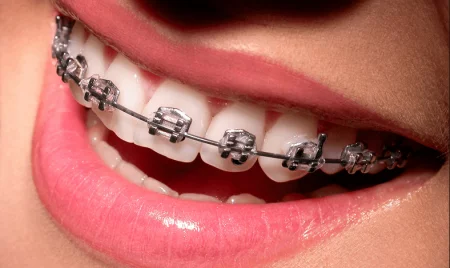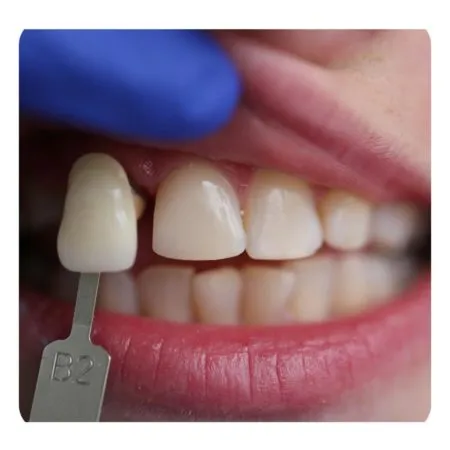- Caries treatment at Dent-House Family Dentistry Clinic
- What is dental caries
- Causes of dental caries
- Types of caries
- Symptoms of tooth decay
- Caries diagnosis
- How do you cure tooth decay?
- Complications of dental caries
- How to avoid tooth decay?
- Advantages of visiting the Dent-House Family Dentistry Clinic
- How much does it cost to treat dental caries in Odessa?
- Specialists
Caries treatment at Dent-House Family Dentistry Clinic
Tooth decay is one of the most common dental problems. It is dangerous because it destroys teeth and can lead to their complete loss. That is why it is worth treating tooth decay and having regular check-ups with your dentist. The dentist can detect a small lesion that will be repaired quickly and discreetly. Treating tooth decay is not a difficult process for a professional dentist. These are the kind of doctors who work in our Dent House family dentistry clinic. The price of treatment depends on the stage of caries and individual indicators.
What is dental caries
Tooth decay is a lesion in the hard tissue of the tooth. It is a complex and long process. Initially, the disease affects the enamel – its demineralisation occurs, and then caries penetrates deep into the tooth. As a result, the hard tissue of the tooth begins to break down and a cavity is formed. If the lesion is left untreated, it spreads further into the pulp and periodontium.
Causes of dental caries
The main cause is bacteria that accumulate on the surface of the teeth and attach to it, causing damage to the enamel. The activity and harmfulness of the bacteria are determined by different factors. Caries develops rapidly in the presence of associated factors, among which are:
- Acids produced by bacteria when eating leftover food after improper or ineffective brushing;
- lowered immunity;
- Improper diet – an abundance of unhealthy food, especially rich in carbohydrates;
- deficiency of minerals and vitamins (especially fluoride, calcium, vitamin D);
- metabolic disorders;
- GI diseases;
- chronic diseases of internal organs;
- hormonal imbalance.
You shouldn’t ignore heredity – some people are more prone to cavities, others less so.
Types of caries
There are four types of dental caries:
- Initial (stain). This is the earliest stage of dental caries, when the tooth is demineralised. The enamel becomes rough and loses its lustre. A brown or white spot can be seen on the surface of the tooth. At the same time, a person does not feel any changes. If such caries is not treated, it passes to the next stage.
- Superficial. After destruction of enamel, caries penetrates further – a carious cavity is formed. However, in this case, the disease affects only the enamel.
- Middle. In this stage, caries has penetrated into the dentin, causing it to become damaged and softened.
- Deep.This is the last type of caries. The disease forms a large carious cavity, which is filled with softened dentin.
Dentists also distinguish 4 types of tooth decay, depending on where the tooth is affected:
- fissure ⎼ in the anatomical recesses at the top of the tooth;
- neck ⎼ near the gingiva, closer to the root;
- aproximal ⎼ between the teeth;
- tooth root decay.
If a tooth is affected for the first time, it is called primary caries. If the tooth has already had a filling, it is called secondary caries.
Symptoms of tooth decay
Sometimes a person does not suspect that he or she has initial caries, because the characteristic spot can not be seen. But superficial, medium and deep caries are indicated by such symptoms:
- hot/cold/acid reaction;
- increased tooth sensitivity when brushing;
- pain when chewing;
- bad breath;
- food getting into the carious plane;
- sharp, throbbing pain;
- swelling and redness of the gums.
The rate of tooth decay can vary, but most often caries develops slowly. It should be noted that severe pain begins to manifest itself in medium and deep caries.
Caries diagnosis
A person can detect tooth decay on his or her own, but it is better to have it done by a professional dentist. During the external examination, the dentist uses a special mirror, with the help of which he can detect problem areas. If a darkened spot is detected, the doctor checks it with a special tool, as the enamel becomes softer due to caries.
Sometimes more serious tests are required to detect tooth decay. These include radiography or panoramic image of the jaw. The price of the procedure is 400 UAH.
How do you cure tooth decay?
The treatment of the disease depends on its stage:
- In the initial stage, the doctor removes the stain from the tooth surface and fills the gap with fluoride. As a result, the enamel is restored and tooth decay stops.
- Second and third degree caries require more serious treatment. The dentist uses anaesthesia. After complete numbness, the dentist removes the affected areas with a drill or laser. Next, the cleaned surface is disinfected, dried and covered with a special agent – gel, which provides good adhesion of the filling with the tooth surface. Next, the colour of the filling is selected to match the enamel. The material is filled with the cleaned carious cavity, and then it is illuminated with a special lamp for hardening. Next, the dentist processes the filling so that it completely repeats the anatomical shape of the tooth and does not interfere with the patient.
- The treatment of the last stage is more complicated – two-stage. First, the doctor cleans the cavity. In the most amount of cases, it is necessary to remove the nerve. After this procedure, the dentist puts medicine and closes the cavity with a temporary filling to avoid infection and inflammation. You must wait a few days for a permanent filling to be placed.
Most often, photopolymer, glass ionomer and composite materials are used for fillings. The first ones are the most popular because they are universal and easy to use. Glass ionomer materials are most often used in paediatric dentistry, as they contain fluoride and adhere more firmly to the tooth tissue. Composite fillings are used less frequently. The dentist always selects the type of filling individually.
Many people doubt whether it is worth to treating decayed baby teeth. Dentists are unanimous in their decision: it is necessary. In case of children, dental caries can develop rapidly, leading to the destruction of teeth. Moreover, the disease can damage the rudiments of permanent teeth. Therefore, you should always visit a paediatric dentist.
The smaller the tooth decay, the easier it is to treat. The cost of treatment will also be less. So remember to see your doctor regularly.
Complications of dental caries
If left untreated, the disease develops into complications. These include:
- Inflammation of the pulp (soft tissue of the tooth) – pulpitis;
- inflammation of the root tissue of the tooth – periodontitis;
- purulent inflammation;
- of tooth decay.
Any complications are very unpleasant and painful. Therefore, if you have not treated tooth decay in time and it has led to complications, run to the doctor anyway. The earlier you start treatment, the higher the chance to save the tooth is. Otherwise, you will have to resort to tooth extraction.
How to avoid tooth decay?
It is difficult to protect against tooth decay. However, it is possible to minimise the risks of its occurrence. To do this:
- Brush your teeth twice a day and after every meal.
- Use dental floss and special rinses.
- Eat more raw fruit and vegetables.
- Consume less carbohydrate foods.
- Treat chronic diseases (especially GI diseases) in time.
- Avoid vitamin and mineral deficiencies.
- Be sure to visit your dentist every six months.
Remember that the best treatment is prevention.
Advantages of visiting the Dent-House Family Dentistry Clinic
“Dent House” is a premium family dentistry clinic with many years of experience, which is located in Odessa.
We are chosen by many Ukrainian patients, because the advantages of cooperation with us are obvious:
- A wide range of services. In our clinic you can not only treat tooth decay, but also implant teeth, whiten them, put braces and veneers, solve other problems.
- Family-focused approach. This is the “trick” of our clinic – the whole family can solve dental problems at the same time.
- Highly qualified specialists. Our doctors are certified professionals with extensive experience who are constantly upgrading their qualifications. This is confirmed by numerous certificates and diplomas. All doctors necessarily use an interdisciplinary approach and work in a team, which improves the quality of services and reduces treatment time.
- Personalised approach. Every case is special, so we develop a treatment plan for each patient.
- Professional equipment. In our work we use only progressive technologies and certified equipment. This allows us to carry out even the most complex treatment.
- Sterility. We carefully monitor the health and safety of our patients. Doctors use the latest equipment for sterilising instruments. Regular disinfection of the clinic is also a priority.
- Pricing Policy. With a wide selection of materials, we offer patients treatment plans in several pricing options.
- Interior. “Dent-House” in Odessa is a separate building with a cosy and modern interior. Each dental cabinet is decorated thematically. Also at your service is a foyer, a separate patio, a recreation area.
Our dentistry is a real paradise for people who want to receive not only quality dental services, but also positive emotions before, during and after treatment.
How much does it cost to treat dental caries in Odessa?
How much does it cost to treat caries: the cost of the procedure in our clinic “Dent-House” depends on each specific case. Prices for treatment of superficial caries start from 1100 UAH, medium – from 1200, deep – from 1490 UAH. You can get acquainted with the price in more detail in the section of the same name. You can also find out other useful information, read reviews and meet the doctors in absentia.
You can book an appointment by calling (048)777 66 55 or using the online form on the website.
Frequently asked questions about caries treatment
🦷 What causes tooth decay and how to avoid it?
😁 What caries treatment methods are available?
🦷 How do I keep my teeth healthy after cavity treatment?
Cost of services
-
Treatment of caries from 1050 UAH
Specialists

Podborskaya Nadezhda Ivanovna
Врач-стоматолог

Semenyuk Ekaterina Sergeevna
Dentist

Furduy Ekaterina Sergeevna
Children's dentist

Kirilyuk Yulianna Ivanovn
Children's dentist





